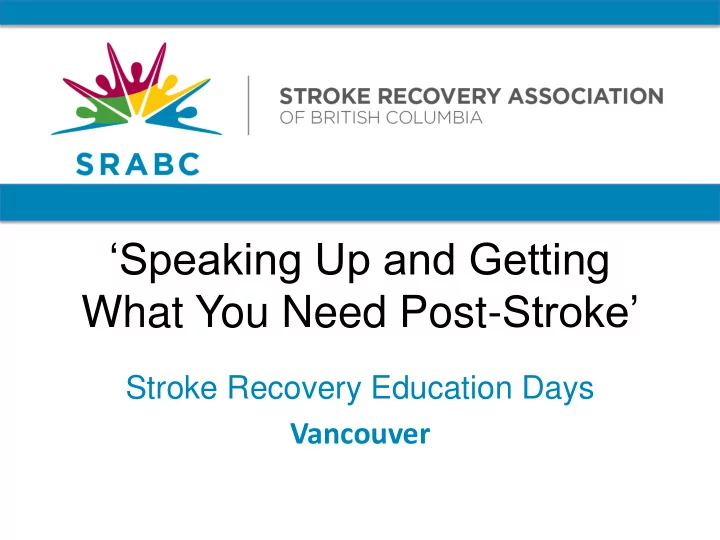

‘Speaking Up and Getting What You Need Post- Stroke’ Stroke Recovery Education Days Vancouver
“When you have exhausted all possibilities, remember this – you haven’t.” ~ Thomas A. Edison
• Being able to ask for what you need while respecting the needs of others • Standing up for your needs or those of a loved one • To be clear, specific and firm way. • Not being afraid to ask for help when you need it.
• A stroke can take away your sense of control. • Speaking up for yourself means that you take personal responsibility for your stroke recovery. • You have a say in what you want and get what you need. • You are empowered to directly impact your own quality of life. • You can make your own choices
• Sometimes we feel challenged because: – We feel unprepared in appointments or when researching information – We worry what others will think or that service will be affected – We may become aggressive or defensive – We may have unrealistic expectations – We might be unwilling to listen to other people, or to explore alternate solutions – English is our second language
• Writing down your questions, thoughts and concerns. • Keeping a diary or notebook handy. • Put your most important questions first • Being patient. Finding the right answer or person may take time. • Finding the person who can give you the answer you need. • Asking the person if they have time to speak with you before you start your conversation.
• Organize your questions and be concise. • Don't be afraid to ask questions, but try to be specific. • Keep records about things like sleeping, eating, symptoms, medication, habits, etc. • The more detailed information you have, the easier it is for the professional to work out the best solution.
• Encourage stroke survivors and caregivers to keep a daily log… • You don’t need to write a book, just a few lines! • Keep track of: – Date and Time – Health or Emotional Concern – What makes it worse? What makes it better? – How long does it last? How long did it last?
• Sometimes we don’t know what we need… • START BY: – Thinking about what you want to be different – Listing strengths and abilities for both the stroke survivor and caregiver. – Listing needs and wants you want met. – Researching and finding resources and programs in the community that meet those needs and wants.
• Physical - e.g. mobility, toileting, activity tolerance and fatigue. • Communication abilities e.g. expressing needs, participating in conversation and understanding directions. • Visual and Perceptual e.g. can you find your way, use public transit, understanding signs, crossing the road. • Behaviour e.g. emotional difficulties, depression, aggression. • Social e.g. feeling comfortable around others, involvement in group activity, friendliness. • Financia l e.g. being able to handle money, ability to pay for programs and services using cash and electronic devices.
Abilities/Strengths External Supports -Is mobile -Friends -Motivated to exercise -Relatives/Caregivers -Likes to socialize with others -Social & Health Services -Can care for self adequately -Neighbours -Can use HandyDART -Work Colleagues independently -Community organizations -Relates well to family and -Income sources friends -Stroke Support Group Needs & Wants Barriers & Challenges -Wants to improve speech - Doesn’t qualify for home support -Wants to volunteer or find -Resources available but unknown work -Some resources not available -Would like to do more including speech language exercise programming -Not able to work after stroke -Needs someone to assist -No family nearby with grocery shopping -Gets lonely at times and would like more visitors 13
• Now that you know what you need or want, you can start researching what exists in your community. • Talk to you doctor, therapist, family, friends, neighbours, other stroke survivors or people you know that have an interest in stroke. • Sometimes there is more than we think, other times there is less.
• It is helpful to keep all of our information in one place such as binder with plastic sleeves for brochures, bus schedules, etc. • Questions to ask about community programs to see if they are right for you: – How long has the program been running? – Who teaches/leads the program? – Length of sessions and frequency? – Cost? – What requirements are necessary to take part? – Are the days and times convenient? – Accessible by public transit and/or HandyDART?
• Visit us online at www.srabc.ca. • Download The Guides to Recovering from a Stroke : • https://strokerecoverybc.ca/7-steps-guide/all- guides/ – Scroll down this page to ‘Download PDF’ and click on the brochure you want to read or print. If you would like copies of these Guides please send an email to office@strokerecoverybc.ca or call us at 604-688- 3603. • Sign up for The Snippets newsletter • Follow us on Facebook, Twitter and Instagram
• Thank you for your participation in our webinar. • We will send you an evaluation via email and would be most appreciative of any feedback you can provide. • Questions? Feel free to get in touch with us by: – Email: office@strokerecoverybc.ca – Toll-free: 1-888-313-3377
Recommend
More recommend